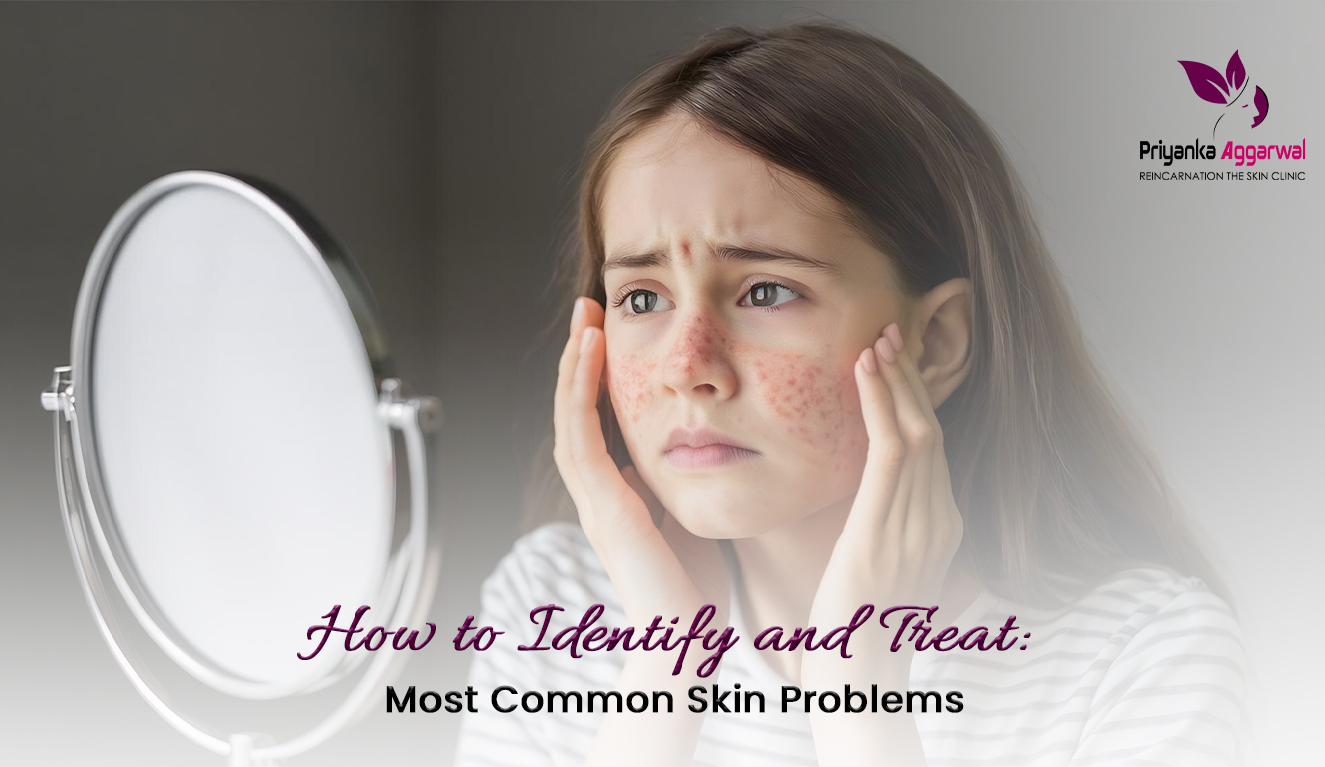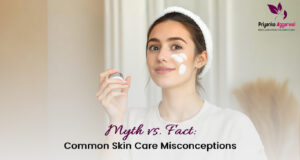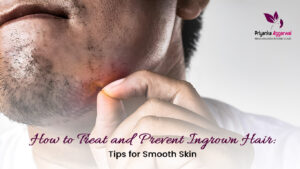What shows on the skin is a reflection of a healthy body even still, that does not alter the fact there are scores of common skin problems one will inevitably have to experience throughout their life which is quite frankly a bitch. So Starting and treating these issues will get you one step closer to clear healthy skin. This blog will discuss common skin problems like Acne, Dry Skin, Eczema and Psoriasis, Hyper-pigmentation or Dark spots, Rosacea and posterior dermatitis & Anti-Aging creams for your specific needs. Common skin problems are easy to identify but the treatment takes some time. The cause or aetiology, identification, and treatment of some common skin problems will be discussed in each section.
Acne:
Causes: It is one of the most common skin problems encountered in the population today, perhaps only second to dandruff (but related to it). Waxing certainly increases the probability of acne rather than pimples. This occurs when hair follicles become clogged with oil, dead skin cells, and bacteria. The causes of Acne are as follows.
- Hormonal Changes: Fluctuations in hormones, such as during puberty, menstruation, or pregnancy, can increase sebum production.
- Diet: high-glycemic index foods (Sugars), dairy, and some fats can worsen acne.
- Stress: Stress can trigger the release of hormones that stimulate oil production.
- Medications: Some drugs, such as those prescribed for depression or zombies (steroids) suppress the immune system and therefore may worsen acne.
- Heredity: If other people in your family have acne, there is a greater chance you will get it.
Identification: We usually notice acne in a few ways:
- Comedones: Clogged pores, closed (whiteheads), or open (blackheads).
- Papules: Small pink or red bumps that can be more painful.
- Pustules: include red bumps with a white center.
- Either Nodules or Cysts: Large and painful lumps under the skin.
Treatment: The treatment of acne usually involves a two-pronged approach utilizing topical and systemic therapies:
- Topical treatments:
- Benzoyl Peroxide – Kills P. acne and also opens pores.
- Salicylic acid – clears dead skin cells and reduces redness.
- Retinoids – promote cell turnover and prevent clogged pores a major part of acne.
- Oral Medications:
- Antibiotics – Triggers of inflammation & kill good bacteria as agents.
- Hormonal Drugs – Birth control pills in women to regulate the hormones of their bodies and reduce acne.
- Isotretinoin – A most effective treatment for severe acne but has significant adverse effects
- Professional Treatments:
- Chemical Peels: These help to temporarily remove the outer layer of the skin lending a softer appearance and offering anecdotal reduction in scarring.
- Light therapy: Kills bacteria and reduces inflammation.
In this way, you can treat your common skin problems easily and get rid of them.
Dry Skin:
Causes: This is another common skin problem, which can be due to different causes such as:
- Environmental Factors: Harsh weather, Cold Climate poor high humidity, and hot sun exposure can rob the skin of moisture.
- Age: moisture retention properties in our skin lessen with age.
- Skin: you can get eczema and psoriasis, leading to dry skin.
- Very fine soaps: Alcohol or fragrances in products can remove skin moisture.
- Medical Conditions: Furthermore, thyroid disorders or diabetes can also cause itchy dry skin.
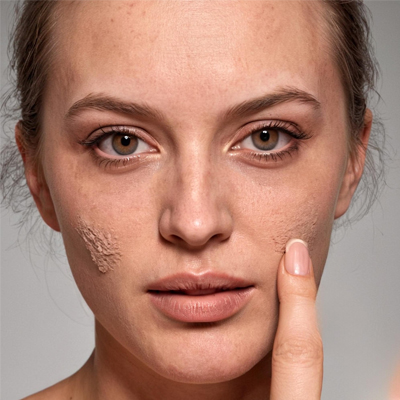
Identification: Symptoms & appearance of Dry skin:
- Rough Feeling: Skin feels coarse and scales
- Tightness: Skin might feel tight or uncomfortable, particularly after cleaning.
- Flakiness: Skin may appear scaly or patchy during the onset stages of dehydration.
- Cracking: To the point that if it is really dry, then you can even crack a break in which case there could be blood or infection.
Treatment: Take the following when it comes to treatment for dryness on the skin.
- Moisturizers: Use ceramides, glycerin, and hyaluronic acid-rich creams or ointments, your best bets for emollients. Apply the moisturizers after a shower to retain moisture.
- Gentle Cleansers: Choose gentle, unscented cleansers that don´t eliminate natural oils from your skin.
- Humidifiers: Putting a humidifier in your home to add moisturize air, especially during the winter months.
- Avoid Hot Showers: Letting the hot water touch your skin can dry it out even further. Instead, choose lukewarm water. By doing this easy treatment you can get rid of common skin problems.
Eczema:
Causes: Eczema or atopic dermatitis is a chronic skin condition that affects hundreds of thousands of people and it might be one of the most common skin problems. it likely involves:
- Family history: the presence of eczema or other allergies in your family makes you more likely to develop it.
- Dysfunction of Immune System: Overactivation of the immune response leads to inflammation.
- Environmental Factors: All that may cause the skin to become red and inflamed irritants like soap or detergent trigger an allergic reaction in eczema patients.
Identification: Dry patches are often reddened on the face and even the regions surrounding the hands, elbows, and the back of the knees.
- Severe itching: Skin damage and infection from constant scratching.
- Lichenification: The constant rubbing on the skin can cause lichenification, a thickened leather-like condition.
Treatment: Eczema is also a very common skin problem and Eczema is only managed through symptoms and preventing flare-ups.
- Moisturizers: Apply a thick cream or ointment to the skin
- Topical Corticosteroids: They reduce inflammation and itching
- Calcineurin Inhibitors Non-steroidal topical creams that remove redness and itchiness.
- Antihistamines: Oral antihistamines are used to alleviate itching, particularly at night.
Hyperpigmentation:
Causes: This is the outcome of the overproduction of melanin in certain parts of our skin, causing dark spots or patches. Some of the common causes for this very common skin problem are:
- High sunlight: Sun exposure rays trigger melanin.
- Hormonal Changes: Pregnancy or birth control pills could cause conditions like melasma.
Identification: Hyperpigmentation comes in the following forms:
- Hyperpigmentation: spots that are a bit darker.
- Appearance: Dark spots or patches, flat or raised.
- Common Areas: Face, hands, shoulders, arms.
Treatments: There are various treatments for hyperpigmentation and these include:
- Active ingredients: Hydroquinone- Melanin inhibitor; lightens skin
- Vitamin C: An antioxidant that lightens the skin and reduces skin pigmentation.
- Retinoids: Boost cell turnover, improving skin texture.
- Chemical peel: peels away the top layer of skin to minimize dark spots.
- Use of Laser Therapy: Focused treatments can prove to be entirely beneficial in diminishing hyperpigmentation.
- Put on sunscreen: Wearing a broad-spectrum SPF50 is necessary to prevent dark spots from getting worse. By doing this treatment we can fight this common skin problem.
Rosacea:
Causes: Red Skin Types, Causes Rosacea is a normal skin condition that mostly affects the face and sarcoid makes your face marked red with noticeable blood vessels widened some containing;acne-like pus-filled bumps. This is also one of the common skin problems. Various reasons behind this common skin problem are:
- Genetics: if other people in your family have had rosacea, you are at an increased risk of getting it. blood relation with a history of rosacea may also increase the probability.
- Symmetrical Melasma Larger Areas: This form appears in larger, symmetrical patches on the face.
- Environmental Triggers: Flare-ups can be caused by drastic temperature changes as well hot temperatures bright sunlight burning into the skin, and exposure to certain types of skincare applications.
- Lifestyle: Alcohol, spicy foods, and stress can also play a part.
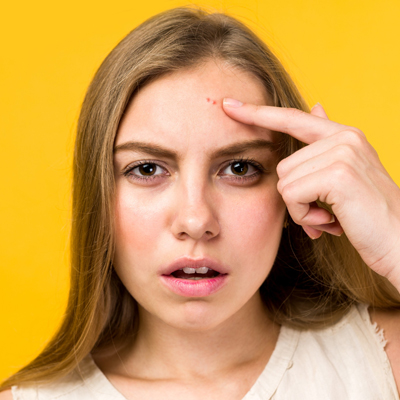
Identification: Rosacea is identified by:
- Flushing: You have frequent or constant redness of the face, including the nose and cheeks.
- Bloody Bump: Tiny red vessels may be seen in the dilated blood vessel.
- Acne: It is the red irritation or inflamed bumps that will look like acne.
Treatment: Treatment of rosacea more often than not necessitates an approach with multiple levels:
- Topical Treatments:
- Topical metronidazole: A gel that helps reduce inflammation and redness.
- Azelaic Acid: Reduces redness and is anti-inflammatory
- Oral Medications:
- Antibiotics: Oral antibiotics in low doses to reduce inflammation.
Dark Circles:
Causes: Dark circles under the eyes are a very common skin problem and might be due to:
- Genetic factors: If there is a family history, one is more likely to get dark circles.
- Sleep deprivation: People deprived of sleep show paler skin where vessels are easily identifiable.
- Aging: The skin loses collagen, and its thickness goes down with age, which means the dark circles show up better.
- Allergies: Reactions to allergens cause swelling around the eyes or even darkness under them.
Identification: Dark circles are present as bluish, purplish, or dark brown discoloration under the eyes.
- Edema: Swelling often accompanies dark circles, especially on waking.
Treatment: Lifestyle modification and topicals are used primarily in dark circle treatment:
- Sleep Hygiene: sleep for at least 7-9 hours every night.
- Cold Compress: Cold packs may be used to reduce swelling and constrict blood vessels.
- Topical Treatments: Cream that includes caffeine tends to cut swelling. Caffeine is very useful to treat all the common skin problems.
Conclusion:
Understanding and treating common skin problems, for instance, acne, dry skin, eczema, hyperpigmentation, rosacea, and dark circles would be an important factor in maintaining healthy skin, with a different cause, identification signs, and treatment options for each. These common skin problems are very severe and treating them is very important.
Such conditions can be dealt with greatly by following customized skincare routines and maintaining lifestyle changes. For such conditions, professional advice from a dermatologist is sought. Only proper care and a proper approach will help you achieve your dream of having clear radiant skin and fight against these common skin problems. Dr Priyanka Aggarwal is one of the best doctors for complete skin and haircare treatment. If you have any issues related to common skin problems, dr.Priyanka is always here to help you through their effective treatments.
Read more: Quick and Effective Skincare Routine for Busy Lifestyles
FAQ
How to get clear skin?
Clear skin is achieved through a consistent daily skincare routine of cleansing, exfoliating, and moisturizing. Stick to skin-appropriate products, drink plenty of water, consume a balanced diet, or exercise regularly, and do not forget your sunscreen.
Can stress cause skin problems?
Stress can indeed aggravate many skin problems associated with oil production and inflammation (acne, eczema).
How can acne and dryness be treated at the same time?
Suffer from acne and instead, he will use a gentle hydrating cleanser because it is lighter, such as Eucerin Gentle Hydrating Cleanser or Cetaphil Regular Facial Foam no matter what dermatologists say over them just like dry skin to avoid using anything thick even the most non-comedogenic of moisturizers. Introduce acne treatments like salicylic acid or benzoyl peroxide slowly so as not to dry out the skin too much.

